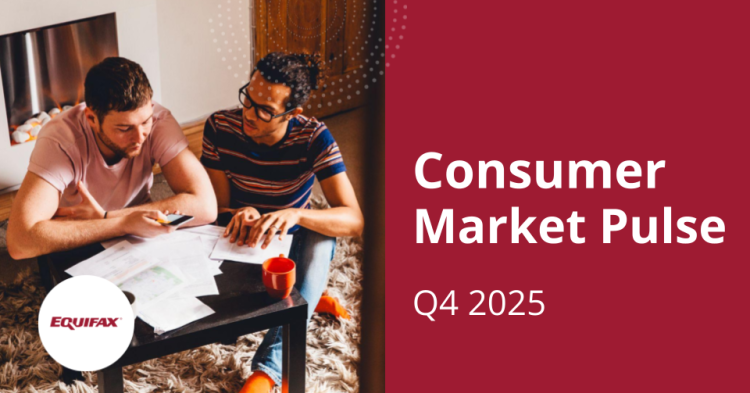Rate of Decline Slows for Business Credit Demand
Equifax Quarterly Business Credit Demand Index: Sept 2019
Overall business credit applications down -6.40% (vs Sept quarter 2018)
Growth in business loan applications up +3.34% (vs Sept quarter 2018), while trade credit applications fell -4.21% (vs Sept quarter 2018).
Asset finance applications declined -24.88% (vs September 2018).

Equifax Quarterly Business Credit Demand Index: Sept 2019
Overall business credit applications down -6.40% (vs Sept quarter 2018)
Growth in business loan applications up +3.34% (vs Sept quarter 2018), while trade credit applications fell -4.21% (vs Sept quarter 2018).
Asset finance applications declined -24.88% (vs September 2018).
SYDNEY – November 1, 2019 – The rate of decline in business credit demand is slowing, buoyed by a recovery in business loan applications, according to data from the latest Quarterly Business Credit Demand Index (Sept 2019).
Released today by Equifax, the global data, analytics and technology company and the leading provider of credit information and analysis in Australia and New Zealand, the index measures the volume of credit applications for trade credit, business loans and asset finance. In the September 2019 quarter, business loan applications grew by +3.34% year on year. All states experienced positive growth except for ACT and NT.
The rate of decline in trade credit applications slowed; contracting by -4.21% in the September 2019 quarter compared to the previous year. Asset finance applications also slowed their rate of decline to -24.88%.
Moses Samaha, Executive General Manager Customer and Solutions, Equifax said: “It’s a positive story across Australia that there may be a potential softening in the decline of business credit demand, down by -6.4% in the September 2019 quarter compared to -8.9% in the March 2019 quarter.”
The improvement in business confidence can be seen in the rise of business loan applications across two consecutive quarters: from +0.90% in the June 2019 quarter to 3.34% in the September 2019 quarter.
“The significant improvements across the eastern seaboard are a positive sign for the economy in general. Even Victoria, which earlier this year showed strong negative business credit demand, is now recovering. This improvement in Victoria sees the gap between the mining and non-mining states almost close,” Mr Samaha added.
“While asset finance applications are still low, the rate of decline has softened. Auto finance makes up the larger portion of volume in the asset finance category. The decline in applications commenced in September 2018 and continued, but we expect to see an improvement in the December quarter results.
The pace of decline in overall business credit applications eased in the September quarter for VIC (-8.63%), NT (-7.45%), QLD (-6.03%), NSW (-5.20%), SA (-3.16%) and TAS (-1.70%). Although the non-mining jurisdiction of VIC experienced strong negative demand, this was an improvement on the June 2019 quarterly downturn of -11.14%. WA (-6.74%) and ACT (-7.70%) both experienced a lowering of business credit demand compared to the previous quarter.
Business loan applications strengthened in the September quarter (+3.34%) in most states. There was growth in SA (+6.38%), NSW (+4.90%), WA (+4.42%), QLD (+4.35%), TAS (+1.31%) and VIC (+0.84%). A decline was seen in ACT (-3.54%), with NT (-7.92%) experiencing the largest fall in business loan applications.
Trade credit applications declined overall in the September quarter (-4.21%). However, there was growth in trade credit applications in TAS (+24.92%), NT (+5.54%) and ACT (+1.24%). When compared with the June 2019 quarter, QLD (-4.98%), VIC (-4.22%), NSW (-3.70%) and SA (-0.36%) experienced small declines. WA (-11.35%) experienced a more substantial fall compared to the previous quarter.
Asset finance applications experienced a large decrease in the September quarter (-27.96%). The largest decline was seen in VIC (-27.96%), followed by TAS (-25.89%), QLD (-24.32%), NSW (-23.86%), ACT (-23.72%), NT (-23.40%), WA (-21.87%) and SA (-21.33%).



About Equifax
Equifax is a global data analytics company using unique data, innovative analytics, technology and industry expertise to power organisations and individuals around the world by transforming knowledge into insights that help make more informed business and personal decisions.
Headquartered in Atlanta, Ga., Equifax operates or has investments in 24 countries in North America, Central and South America, Europe and the Asia Pacific region, with the acquisition of Veda, a data analytics company and the leading provider of credit information and analysis in Australia and New Zealand. Combined, the companies bring over 170 years of data and insights experience to the marketplace.
Equifax is a member of Standard & Poor's (S&P) 500® Index, and its common stock is traded on the New York Stock Exchange (NYSE) under the symbol EFX. For more information, visit www.equifax.com.au or follow the company’s news on LinkedIn.
Note to Editors
The Quarterly Business Credit Demand Index by Equifax Index measures the volume of credit applications that go through the Commercial Bureau by credit providers such as financial institutions and major corporations in Australia. Based on this it is a good measure of intentions to acquire credit by businesses. This differs to other market measures published by the RBA/ABS, which measure new and cumulative dollar amounts that are actually approved by financial institutions.
DISCLAIMER
Purpose of Equifax media releases:
The information in this release does not constitute legal, accounting or other professional financial advice. The information may change, and Equifax does not guarantee its currency or accuracy. To the extent permitted by law, Equifax specifically excludes all liability or responsibility for any loss or damage arising out of reliance on information in this release and the data in this report, including any consequential or indirect loss, loss of profit, loss of revenue or loss of business opportunity.
Related Posts

Mortgage demand hits four-year high as a second consecutive quarter of double-digit growth for credit cards is observed and most prominent among younger Gen Z’s.

The latest Equifax Business Market Pulse for Q4 2025 reveals a multi-speed recovery. Large businesses are leading the way on credit demand growth, with an observed increase in overall demand reaching heights of up to +19.4% (trade credit) in some sectors, such as hospitality.
